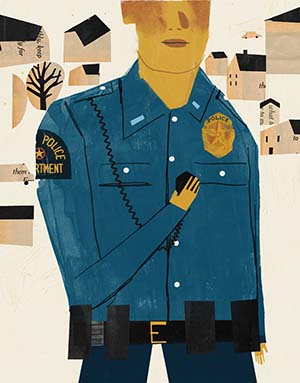
As soon as he could after graduating from high school, Pat enlisted in the Navy and became a master-at-arms. In the old British and early American naval service, masters-at-arms were charged with enforcing the sometimes brutal discipline on board ship and at shore facilities. This was especially needed during times of war, when nonmilitary sailors (and sometimes common farmers and tradesmen) were forcibly “pressed” (basically kidnapped) into service on warships, sometimes for years. Mutiny was very much feared, and the master-at-arms and his group, along with a small group of Marines, were the only thing keeping the crew from taking over the ship.
The job evolved over time, and as reforms were implemented and service became voluntary, the master-at-arms became responsible for enforcing standard rules and apprehending and detaining disorderly sailors and sometimes officers. Before 9/11, you most commonly saw masters-at-arms guarding ships and bases and escorting drunk sailors back to bed after a rough night on the town. It is difficult for civilians to appreciate, but when you’re stuck on a ship for eight months at a time, working seven days a week for 14-hour shifts, sometimes down in an engine room with no windows and sweltering heat, you tend to want to blow off a little steam, and so these young sailors tend to drink a little too much when the ship pulls into port. Many times on the Enterprise, where I served as a young officer from 2000 to 2002, I saw masters-at-arms handling out-of-control kids. They did their jobs with respect and professionalism and were measured in their responses.
Pat knew, even at age 17, that serving others and being of assistance to shipmates was his calling, and he chose to be a master-at-arms. This is traditionally not a career path with much possibility of advancement. It is difficult to make chief rank (the goal of most enlisted sailors). He was certainly smart enough and motivated enough to have attempted to become an officer, but he knew that once that happened he would be relegated to administrative, management duties, and he preferred actually working for a living. He loved being a sailor. He did not mind the bad hours, the long days standing guard in the desert with all the heavy gear in Afghanistan and Iraq. He did several active-duty tours overseas.
Then, back in 2005, Pat made the same decision that I had made. He wanted to continue to serve, but he also wanted to be closer to home. Family was important to him, and so he left active duty and affiliated with the Navy Reserve in Fort Worth. He started looking for a civilian job, as I had. Although Fort Worth was his home and I am sure he would have been welcomed into the Fort Worth Police Department, he chose to join Dallas, because he believed it was a more diverse city with more interesting work and potential, and he would have more opportunity to make a difference. He made it through the academy, made it through his field training, and began work. He also had a daughter whom he dearly loved, and he lit up whenever he spoke of her or thought of her. That was something we had in common, as well.
For about seven months Pat worked for me when I was a supervisor at the Dallas County jail. I say supervisor, but he was such a model officer and hard worker that he needed no supervision. He volunteered for the jobs nobody else wanted to do, and he had a smile on his face every day. After he went back to patrol duties, I would see him about every other day when he would make an arrest and bring someone in. We often chatted about family and his reserve duties. I always felt better after seeing him.
